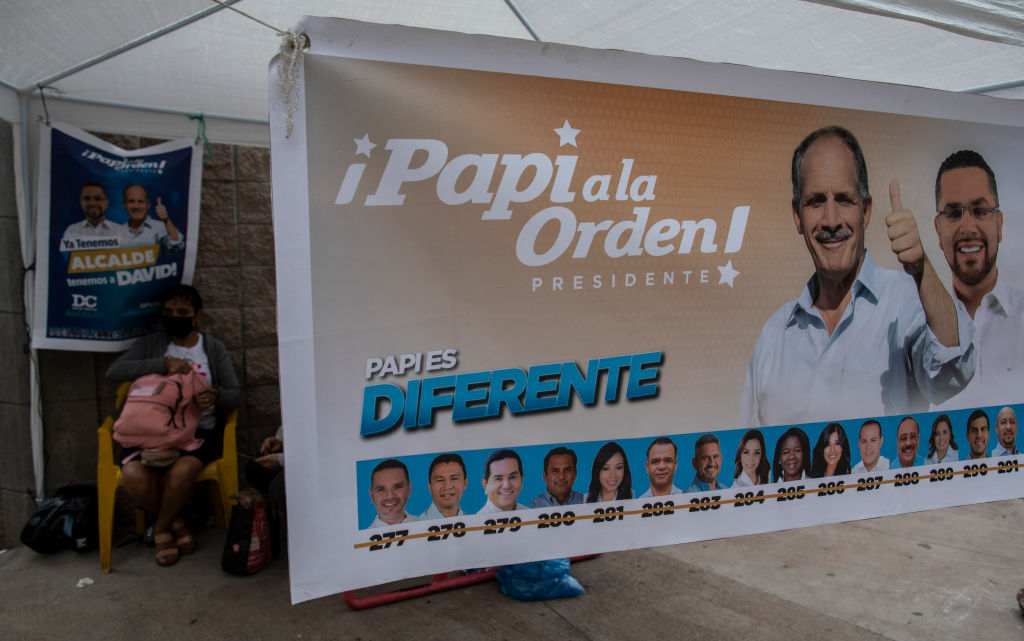Hondurans vote for new president as incumbent faces extradition


A free daily email with the biggest news stories of the day – and the best features from TheWeek.com
You are now subscribed
Your newsletter sign-up was successful
Citizens of Honduras voted Sunday for a new president. The results of the election could remove the governing National Party from office for the first time since it took power in a 2009 military coup that ousted leftist President Mel Zelaya, who sought to align Honduras with Hugo Chavez's Venezuela.
Xiomara Castro, Zelaya's wife, currently leads in the polls, NPR reports. National Party candidate Nasry Asfura is in second place. His campaign has benefited from the National Party's entrenched political machine, which distributes cash payments and other gifts to voters, but has been marred by allegations that Asfura embezzled millions of dollars during his two terms as mayor of Tegucigalpa, the nation's capital city. The third-place candidate, Yani Rosenthal, returned to Honduras in 2020 after serving a prison sentence in the U.S. for money laundering.
Observers have expressed concerns that violence could erupt if a clear result does not emerge quickly. Twenty protestors were killed during demonstrations that followed the 2017 election. Political instability and gang activity in Honduras have already prompted some Hondurans to flee the country. Many of these refugees joined migrant caravans that traveled north through Mexico toward the U.S. border.
The Week
Escape your echo chamber. Get the facts behind the news, plus analysis from multiple perspectives.

Sign up for The Week's Free Newsletters
From our morning news briefing to a weekly Good News Newsletter, get the best of The Week delivered directly to your inbox.
From our morning news briefing to a weekly Good News Newsletter, get the best of The Week delivered directly to your inbox.
The incumbent president of Honduras, Juan Orlando Hernández, has been accused by U.S. prosecutors of funding his campaigns with drug money and could be extradited to the U.S. if his party loses power, according to The Washington Post. His brother, former Honduran lawmaker Tony Hernández, is already serving a life sentence in a U.S. prison following a 2019 conviction for smuggling tons of cocaine into the United States.
A free daily email with the biggest news stories of the day – and the best features from TheWeek.com
Grayson Quay was the weekend editor at TheWeek.com. His writing has also been published in National Review, the Pittsburgh Post-Gazette, Modern Age, The American Conservative, The Spectator World, and other outlets. Grayson earned his M.A. from Georgetown University in 2019.
-
 The environmental cost of GLP-1s
The environmental cost of GLP-1sThe explainer Producing the drugs is a dirty process
-
 Greenland’s capital becomes ground zero for the country’s diplomatic straits
Greenland’s capital becomes ground zero for the country’s diplomatic straitsIN THE SPOTLIGHT A flurry of new consular activity in Nuuk shows how important Greenland has become to Europeans’ anxiety about American imperialism
-
 ‘This is something that happens all too often’
‘This is something that happens all too often’Instant Opinion Opinion, comment and editorials of the day
-
 Epstein files topple law CEO, roil UK government
Epstein files topple law CEO, roil UK governmentSpeed Read Peter Mandelson, Britain’s former ambassador to the US, is caught up in the scandal
-
 Iran and US prepare to meet after skirmishes
Iran and US prepare to meet after skirmishesSpeed Read The incident comes amid heightened tensions in the Middle East
-
 EU and India clinch trade pact amid US tariff war
EU and India clinch trade pact amid US tariff warSpeed Read The agreement will slash tariffs on most goods over the next decade
-
 Israel retrieves final hostage’s body from Gaza
Israel retrieves final hostage’s body from GazaSpeed Read The 24-year-old police officer was killed during the initial Hamas attack
-
 China’s Xi targets top general in growing purge
China’s Xi targets top general in growing purgeSpeed Read Zhang Youxia is being investigated over ‘grave violations’ of the law
-
 Panama and Canada are negotiating over a crucial copper mine
Panama and Canada are negotiating over a crucial copper mineIn the Spotlight Panama is set to make a final decision on the mine this summer
-
 Why Greenland’s natural resources are nearly impossible to mine
Why Greenland’s natural resources are nearly impossible to mineThe Explainer The country’s natural landscape makes the task extremely difficult
-
 Iran cuts internet as protests escalate
Iran cuts internet as protests escalateSpeed Reada Government buildings across the country have been set on fire
